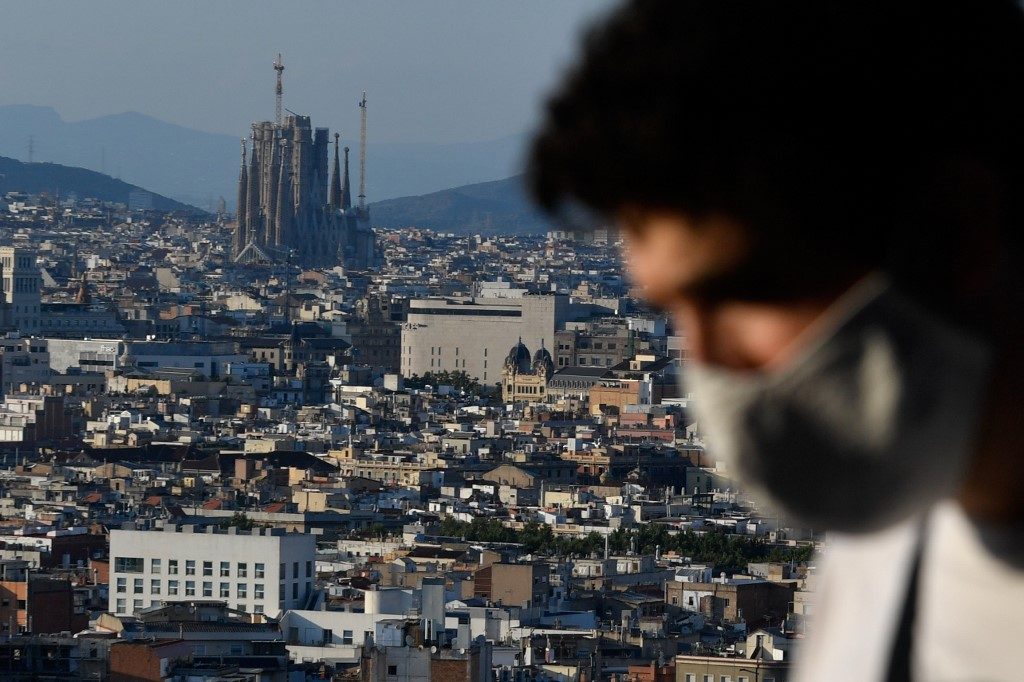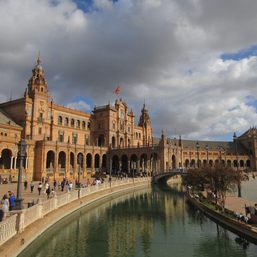SUMMARY
This is AI generated summarization, which may have errors. For context, always refer to the full article.

Spain plunged into recession in the 2nd quarter after its gross domestic product (GDP) tumbled by 18.5% due to the coronavirus pandemic, official figures showed on Friday, July 31.
In the 1st quarter, growth had fallen by 5.2%, the Institute of National Statistics said (INE). A recession is commonly defined as two consecutive quarters of a contraction in GDP.
The first of estimate by INE is broadly in line with the forecast by the Bank of Spain which had seen a contraction in the economy of between 16% and 22% for the period between April and June at the height of the lockdown when all non-essential activities were halted.
The restrictions imposed under the state of emergency, which began in mid-March, were only gradually lifted in May and June.
The business, transport, and hotels sector were all badly hit, with a 40% drop compared with the 1st quarter.
And tourism, a pillar of the Spanish economy which accounts for 12% of GDP, suffered with a 60% drop in revenues compared the same period in 2019.
Construction fell by 24% compared with the 1st quarter and industry by 18.5%. Household consumption dropped by around 21% and business investment by 22% while exports fell by around a third.
The Spanish government sees the economy contracting by 9.2% overall in 2020, but the Bank of Spain says that figure could reach 15%.
‘Recovery years away’
Analysts at Capital Economics said they were expecting the Spanish economy to contract by 12% this year “with a return to pre-virus size years away.”
“The record plunge in Spain’s GDP of 18.5% is likely to have been one of the biggest falls of any eurozone country in the 2nd quarter, illustrating the severity of the country’s lockdown and its slow and partial recovery,” it said in a note.
“And the recent rise in virus cases is likely to hold back the recovery in tourism, strengthening our view that the Spanish economy will struggle to rebound as quickly as its neighbors.”
Unicredit analysts said although it saw a gradual recovery “broadly in line with the rest of the eurozone,” the surge in new virus cases threatened “to weaken an already fragile recovery.”
Commenting on the “unprecedented” fall in growth, Prime Minister Pedro Sanchez said the worst had passed and it was time to focus on recovery.
“This moment has passed, it is true that after resisting [the virus] came the economic revival, and now we must focus on what the economic recovery means.”
Ana de la Cuenca, secretary of state for the economy, said data since the start of May had shown “a gradual reactivation of economic activity.”
“We have to consolidate the recovery and for that, it is essential to contain the new outbreaks,” she said.
Spain, where the virus has killed more than 28,400 people, has been struggling with a surge of new infections that has sparked European travel warnings and a British quarantine move which has damaged the tourism industry’s fledgling recovery.
However, it will benefit considerably from the historic 750-billion-euro rescue plan agreed by the European Union’s 27 member states earlier this month under which it will receive 140 billion euros.
Economy Minister Nadia Calvino said the government’s measures to prop up the economy – extending its furlough scheme, state-sponsored loans, subsidies for the self-employed – had enabled Spain to avoid GDP collapsing by “more than 25%.”
The pandemic also destroyed more than a million jobs in Spain in the 2nd quarter, mostly in the services and tourism sector.
Unemployment hit 15.3% by the end of June and is expected to reach 19% by the year’s end, the government says, although the International Monetary Fund sees it rising to as much as 20.8%. – Rappler.com
Add a comment
How does this make you feel?


![[Time Trowel] Evolution and the sneakiness of COVID](https://www.rappler.com/tachyon/2024/02/tl-evolution-covid.jpg?resize=257%2C257&crop=455px%2C0px%2C1080px%2C1080px)






![[OPINION] The Camino de Santiago walk: On faith and the law](https://www.rappler.com/tachyon/2023/11/camino-walk-TL-nov-15-2023.jpg?resize=257%2C257&crop=296px%2C0px%2C720px%2C720px)
There are no comments yet. Add your comment to start the conversation.